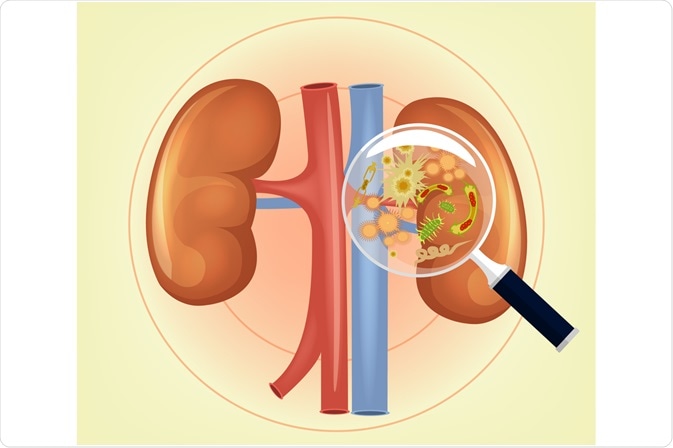Pyelonephritis refers to a lower urinary tract infection (UTI) that has spread to the pelvis of the kidney. The main goals of treating this condition are symptom reduction and infection control. The patient's symptoms and eventual comorbidities guide the decision if empirical therapy should be prescribed, and whether to admit the patient for intravenous antibiotic treatment.

Image Credit: Pretty Vectors / Shutterstock.com
Most patients with pyelonephritis are successfully treated with oral medication on an outpatient basis, with adequate review and follow-up. However, those experiencing vomiting and clinical evidence of dehydration, pregnant women who exhibit symptoms of systemic illness, young infants, and older patients with poor social support often require hospitalization.
Treating uncomplicated pyelonephritis
Treatment should begin prior to receiving the results of blood or urine cultures in patients with a high suspicion of infection. The empiric choice of antimicrobial drugs should be based on the severity of disease, local bacterial susceptibilities, and history of antecedent antibiotic use.
Aminoglycosides (namely gentamicin) and fluoroquinolones are antibiotics preferable to beta-lactams because they achieve a high concentration in renal tissue, which correlates with better cure rates in comparison to serum or urinary drug levels. Still, prescription of a reduced dosage of gentamicin is advisable in patients with a decline in renal function.
Patients with uncomplicated and mild to moderate pyelonephritis are hemodynamically stable and able to take oral medication. The Infectious Diseases Society of America (IDSA) states that the standard 10 to 14 days of outpatient treatment with oral antibiotics is generally sufficient to adequately manage this condition.
Therapy with appropriate empiric antibiotics should result in an improvement within 48 to 72 hours. Strong consideration should be given to a complication of acute pyelonephritis or an alternative diagnosis if the patient does not improve as expected; hence, appropriate additional testing should be performed.
Treatment options for complicated pyelonephritis
Patients who present with severe symptoms including abnormal laboratory parameters, early septic hemodynamic parameters, and/or are unable to take oral medication, or complicated disease, as well as all pregnant patients, should be admitted and treated with intravenous agents. Blood and urine cultures should also be obtained.
Depending on the test results, possible antimicrobial regimens include extended-spectrum aminopenicillins, cephalosporins, antipseudomonal penicillins, aminoglycosides, fluoroquinolones, and carbapenems. Culture results and local resistance patterns should guide the choice of the antibiotic regimen.
The most likely cause of pyelonephritis recurrence is an insufficient duration of initial treatment. The development of antibiotic resistance or selection for another organism is another possibility. If the bacterial strain and its sensitivity profile are the same, a renal ultrasound or computed tomography (CT scan should be obtained.
The treatment of chronic pyelonephritis is aimed at removing the underlying cause in order to prevent further renal damage. Prevention of pyelonephritis can be accomplished by avoiding the risk factors associated with its development. Of primary importance is the prevention of lower UTIs.
References
- http://www.aafp.org/afp/2005/0301/p933.html
- http://www.aafp.org/afp/2011/0901/p519.pdf
- https://www.niddk.nih.gov/health-information/kidney-disease
- https://med.stanford.edu/
- https://www.idsociety.org/
- Crutchlow EM, Dudac PJ, MacAvoy S, Madara BR. Pathophysiology. Jones & Bartlett Learning, 2002; pp. 222-245.
Further Reading
Last Updated: Jun 19, 2023